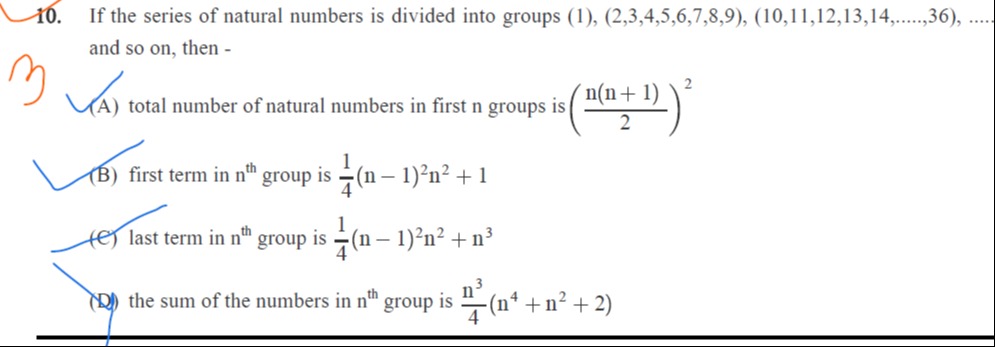Question
Question: If the series of natural numbers is divided into groups (1), (2,3,4,5,6,7,8,9), (10,11,12,13,14,.......
If the series of natural numbers is divided into groups (1), (2,3,4,5,6,7,8,9), (10,11,12,13,14,......,36), ..... and so on, then -

total number of natural numbers in first n groups is (2n(n+1))2
first term in nth group is 41(n−1)2n2+1
last term in nth group is 41(n−1)2n2+n3
the sum of the numbers in nth group is 4n3(n4+n2+2)
All options (A), (B), (C), and (D) are correct.
Solution
-
The grouping is as follows:
- Group 1 has 1 term = 13.
- Group 2 has 8 terms = 23.
- Group 3 has 27 terms = 33.
-
Hence, the total number of natural numbers in the first n groups is
13+23+⋯+n3=(2n(n+1))2.This verifies (A).
-
For the first term of the nth group:
- Since the first term of group 1 is 1 and that of group n is one more than the last term of group n−1, by summing the count of numbers up to group n−1 we get First term=1+k=1∑n−1k3=1+(2(n−1)n)2.
- This is equivalent to 4(n−1)2n2+1, which verifies (B).
-
The last term of the nth group is just the first term plus n3−1. Therefore,
Last term=[4(n−1)2n2+1]+(n3−1)=4(n−1)2n2+n3.This verifies (C).
-
The sum of the nth group is the sum of an arithmetic progression with:
- First term: a=4(n−1)2n2+1,
- Last term: l=4(n−1)2n2+n3,
- Number of terms: n3.
The sum is:
S=2n3(a+l)=2n3[4(n−1)2n2+1+4(n−1)2n2+n3].Simplify the inside:
=2n3[2(n−1)2n2+n3+1].With further algebra (or verifying by testing small values n=1,2,3), one obtains
4n3(n4+n2+2),which verifies (D).
Final Answer: All options (A), (B), (C), and (D) are correct.
Explanation (Minimal):
- The total number of terms in first n groups is the sum of cubes: ∑k=1nk3=(2n(n+1))2.
- The first term in the nth group is one more than the sum of cubes up to n−1: 4(n−1)2n2+1.
- The last term in the nth group adds n3−1 to the first term, giving 4(n−1)2n2+n3.
- Using the AP sum formula, the group sum simplifies to 4n3(n4+n2+2).
